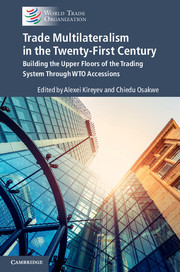 Trade Multilateralism in the Twenty-First Century
Trade Multilateralism in the Twenty-First Century Book contents
- Frontmatter
- Contents
- List of Plates
- List of Figures
- Notes on Contributors
- Foreword
- Acknowledgements
- List of Abbreviations
- Disclaimer
- 1 Making Trade Multilateralism Work for All: The Role of WTO Accessions
- PART I WTO Accessions and the New Trade Multilateralism
- PART II Negotiators’ Perspectives on the WTO Accession Process
- PART III Accessions Acquis: Thematic Perspectives and Implementation Challenges
- 13 How Post-TRIPS Negotiations Reframe the ‘Trade-Related Aspects’ of Intellectual Property after TRIPS: The Lessons of WTO Accessions
- 14 Competition Policy in WTO Accessions: Filling in the Blanks in the International Trading System
- 15 Geographical Indications in the Accessions Landscape
- 16 WTO Accession Commitments on Agriculture: Lessons for WTO Rule-Making
- 17 The WTO-Plus Obligations: Dual Class or a Strengthened System?
- 18 Accession Protocols and the Private Sector
- 19 Post-Accession Support Platform
- 20 Conclusion: Trade Multilateralism - Enhancing Flexibility, Preserving the Momentum
- Contributor Biographies
- Index
- References
14 - Competition Policy in WTO Accessions: Filling in the Blanks in the International Trading System
from PART III - Accessions Acquis: Thematic Perspectives and Implementation Challenges
Published online by Cambridge University Press: 28 November 2017
- Frontmatter
- Contents
- List of Plates
- List of Figures
- Notes on Contributors
- Foreword
- Acknowledgements
- List of Abbreviations
- Disclaimer
- 1 Making Trade Multilateralism Work for All: The Role of WTO Accessions
- PART I WTO Accessions and the New Trade Multilateralism
- PART II Negotiators’ Perspectives on the WTO Accession Process
- PART III Accessions Acquis: Thematic Perspectives and Implementation Challenges
- 13 How Post-TRIPS Negotiations Reframe the ‘Trade-Related Aspects’ of Intellectual Property after TRIPS: The Lessons of WTO Accessions
- 14 Competition Policy in WTO Accessions: Filling in the Blanks in the International Trading System
- 15 Geographical Indications in the Accessions Landscape
- 16 WTO Accession Commitments on Agriculture: Lessons for WTO Rule-Making
- 17 The WTO-Plus Obligations: Dual Class or a Strengthened System?
- 18 Accession Protocols and the Private Sector
- 19 Post-Accession Support Platform
- 20 Conclusion: Trade Multilateralism - Enhancing Flexibility, Preserving the Momentum
- Contributor Biographies
- Index
- References
Summary
Abstract
Important synergies and complementarities exist between trade liberalization initiatives and the application of measures to suppress anti-competitive practices or arrangements. Both anti-competitive practices of firms and state-orchestrated arrangements that restrict competition can undermine the gains from trade in myriad ways. Moreover, trade liberalization can be a powerful tool for addressing competition policy concerns. Whether there is a need to develop for more explicit linkages between national competition policies and the multilateral trading system remains an unresolved question in debates surrounding the future of the World Trade Organization (WTO). The role of competition policy is, however, increasingly being addressed by working parties during the accessions of new WTO members. This chapter finds that, in a vast majority of accessions, the acceding economy is requested to provide information on its domestic competition policy regime. In approximately 80 per cent of all accessions, the acceding parties have made notifications on aspects such as the objectives of the regime, its enforcement mechanisms by relevant agencies, as well as on work under way to put in place an effective competition regime where one is not already extant. This, in itself, shows a clear recognition and acceptance by WTO members of the importance of competition policy as a tool of economic integration. The complementarity between WTO law and competition policy, however, is broader than what is reflected in notifications and observations regarding competition legislation per se. Consequently, the analysis in this chapter also presents an in-depth study of the wider impact of competition in the WTO accession process, taking into account the information provided on aspects of the domestic regime dealing with state monopolies and the treatment of state-owned enterprises (SOEs).
Important synergies or complementarities exist between international trade liberalization and competition law and policy (Anderson and Müller, 2015). Competition policy aims at enhancing consumer welfare and economic growth by promoting competition and deterring practices that restrict it. The intended results are lower prices, enhanced product variety and quality, innovation, and sustainable growth and development. These goals are congruent and powerfully synergistic with those of the multilateral trading system.
Whether there is a need for more explicit linkages between national competition policies and the multilateral trading system – and, if so, what should be the content of related disciplines – currently is an unresolved question in debates surrounding the future of the WTO (Anderson and Müller, 2015).
- Type
- Chapter
- Information
- Trade Multilateralism in the Twenty-First CenturyBuilding the Upper Floors of the Trading System through WTO Accessions, pp. 299 - 319Publisher: Cambridge University PressPrint publication year: 2017


